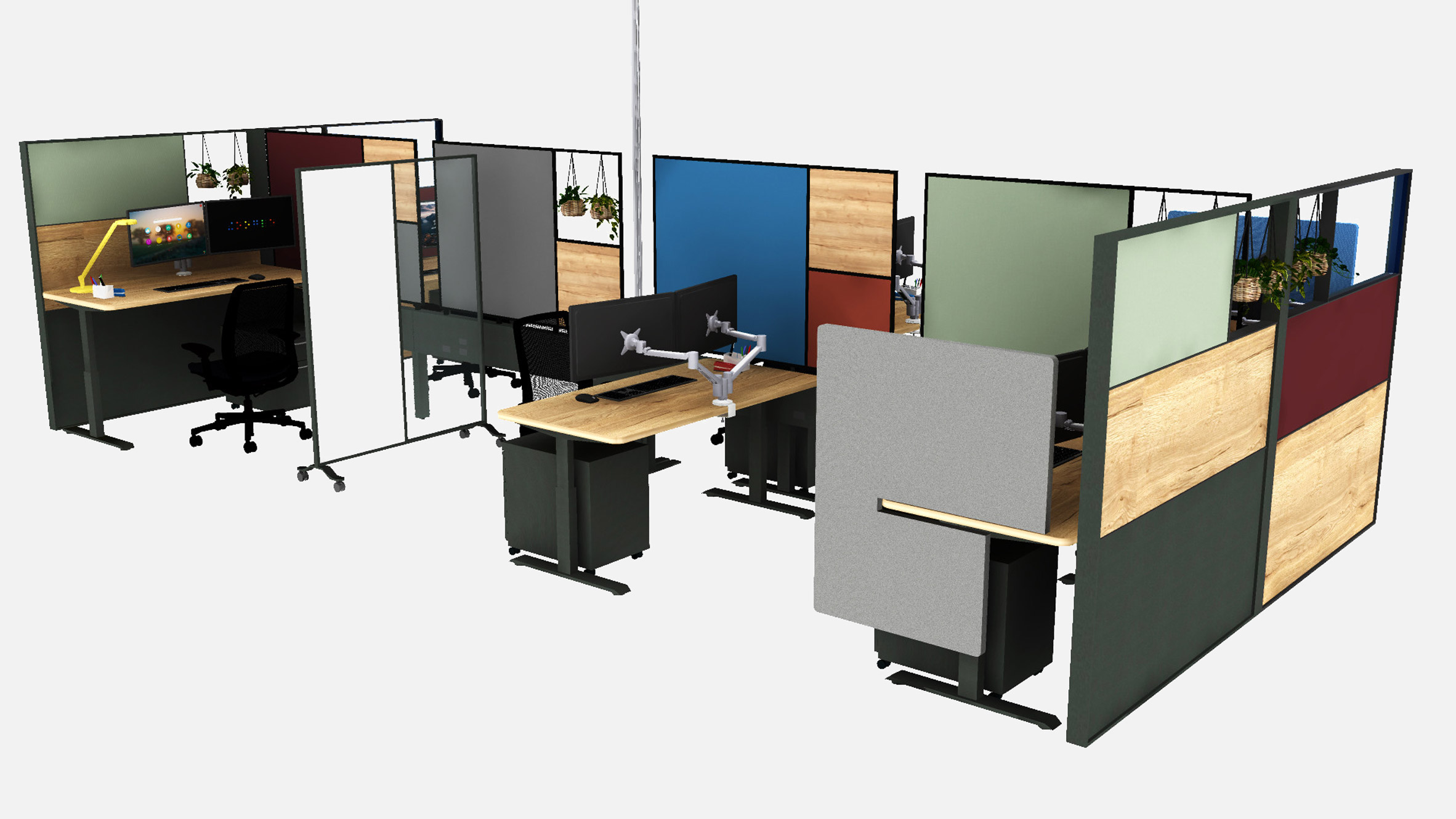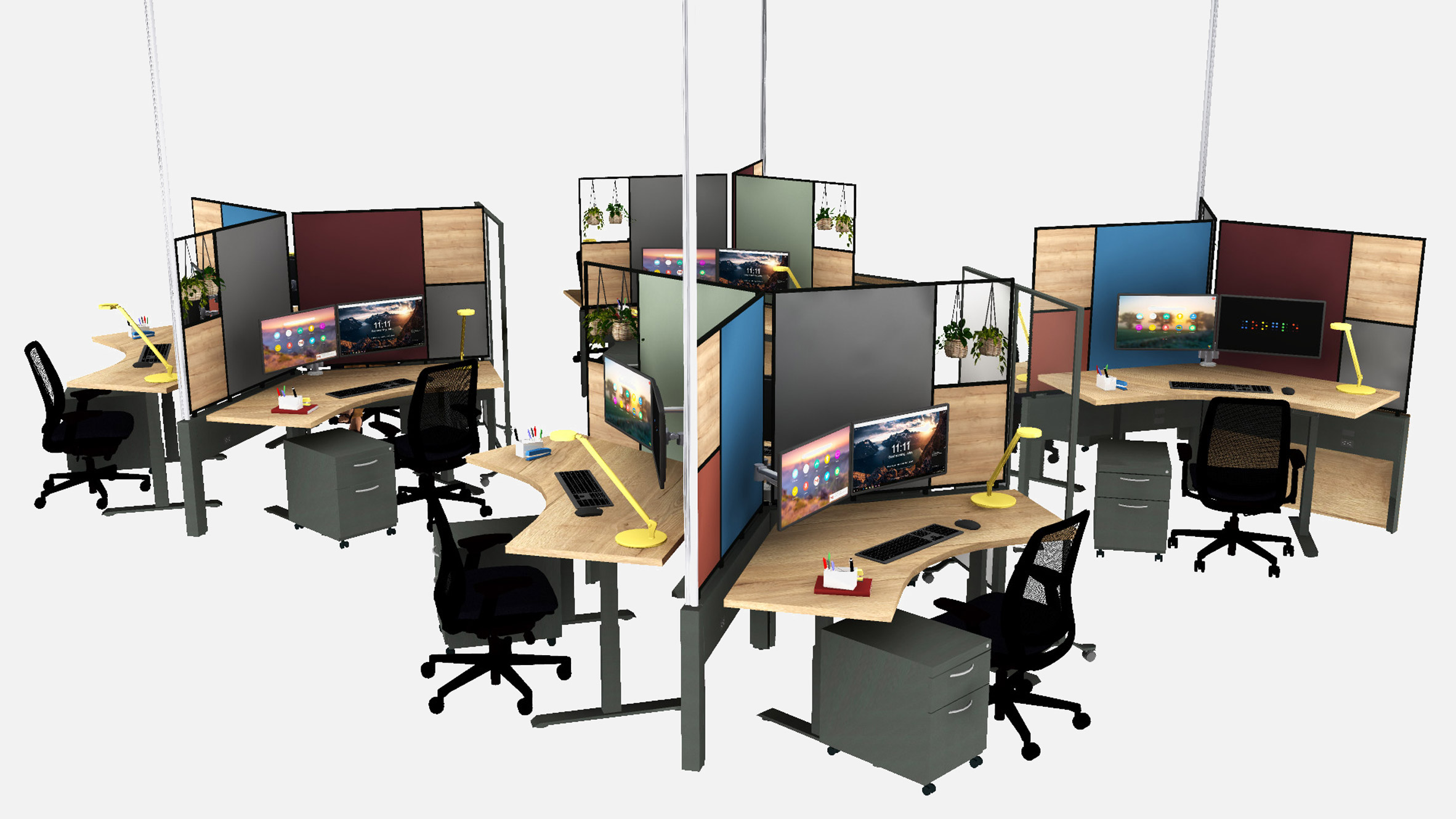
Cubicles will return as the layouts of Silicon Valley offices are rethought, says Form4 Architecture co-founder Paul Ferro, in a guide created to advise its clients on how to return to work after coronavirus lockdown.
San Franscico-based Form4 Architecture developed the guide for its Silicon Valley clients, which include Facebook, Netflix, VMware, Google and Spear Street Capital, to advise them on how to adapt their offices to allow for social distancing following the pandemic.

In the report, the architecture studio states that offices will need to reduce densities, widen walkways and remove almost all shared spaces. The studio suggests that dividers are put up between desks in large open-plan offices in the short term, and believes that cubicles will be widely reintroduced in the longer term.
“Something approximating the cubicle will become normal in the open office,” Ferro told Dezeen.
“To combat the spread of droplets and aerosols, desks will be surrounded by taller partitions and/or screens and we will likely see the use of canopy elements that partially extend above each workstation.”
“The 120 workstation configuration may prove a viable option”
In particular Ferro believes that the 120-degree desk, where three desks are arranged in a circle separated by dividers, is well suited to post-pandemic requirements.
“The 120 workstation configuration, a short-lived option from the past, may prove a viable option as it provides a sense of openness with the lower density and increased separation between seats now required,” said Ferro.
“For the 120s of today, the partitions between the three desks within a pod will need to be taller to minimise the spread of droplets and aerosols.”
Post coronavirus requirements “at odds” with modern workplaces
Ferro believes that much of the core thinking behind the development of Silicon Valley offices will have to be rethought, as designing for spontaneous encounters and to maximise contact will not be possible after the pandemic.
“Before Covid-19, we had the open-plan, more dense than ever; the proliferation of various forms of meeting and collaboration spaces; presentation and training spaces; alternative work spaces; shared furniture; break rooms and cafes; lounges and game rooms; open stairs between floors; and a preference for the mega floor plate versus multiple stories – all of which are intended to maximise interaction and collaboration.”

“The personal apprehensions caused by Covid-19 and the initial possible solutions focused on ‘distancing’ lead us to separate and isolate ourselves from one another, and therefore are at odds with the environmental and cultural characteristics we have come to associate with modern workplaces.”
“An end to hotdesking”
Ferro suggests that desks are arranged into small groups, which he refers to as courtyards, to allow companies to retain some of the feel of pre-coronavirus offices.
“In order to provide a sense of community and the needed collaboration among team members, workstations can be arranged to encompass a team-dedicated ‘courtyard,’ sized and configured to provide the right distancing to allow for discussions while maintaining healthy separation,” he explained.

The report also states that, in the short term at least, coronavirus will lead to “an end to hotdesking”.
“While having the advantage of flexibility in providing separation between workers in the initial return to offices in which not every desk is occupied, hotdesking has the disadvantage of requiring daily desk and chair cleaning protocols; standardisation of computers and software; storage and transport of personal equipment such as one’s keyboard and mouse; and opposition by some staff,” said Ferro.
“Working from home will become commonplace”
Form4 Architecture also predicts that there will be changes in the materials used within offices, with an increase in the use of non-porous, durable, and cleanable materials and a reduction in the use of textured surfaces.
Offices should also make improvements to air conditioning systems and consider incorporating UV lights to sterilise air into certain areas.
It also predicts that touchless doors, elevator controls, toilet partition doors and light switches will become more common.
Overall, Ferro believes the coronavirus will force architects to rethink the workplace and increased working from home will be part of that. Form4 Architecture’s client Facebook recently announced plans to allow employees to work from home permanently.
“Covid-19 has abruptly thrust upon us a new programme requirement to analyse and address as we design the next generation of workplaces,” said Ferro.
“The Silicon Valley office in the long term will be impacted by the discovery that working at home is a very viable option that makes focused type work easier for most; the expense, time suck, and headache of commuting are not missed; working and socialising with co-workers are missed; and a combination of working in the office and from home is desired,” he continued.
“It is very likely that, even after the threat of Covid-19 has passed, working from home for a portion of the week will become commonplace while the office will be used more for in-person team brainstorming and collaboration and to maintain connection and culture, which are more difficult when done remotely.”
Numerous architects and designers are thinking about the form of our future workspaces, with the head of Sheppard Robson’s interiors studio stating that “the office will continue to be a vital part of most of our lives”.
Architecture studio Weston Williamson + Partners explained how it would be creating a social-distancing office for its staff and Woods Bagot devised a series of office layouts for workplaces post-coronavirus.
The post Post coronavirus "the cubicle will become normal" says Paul Ferro appeared first on Dezeen.
